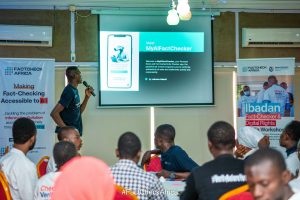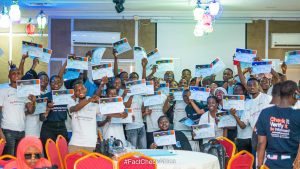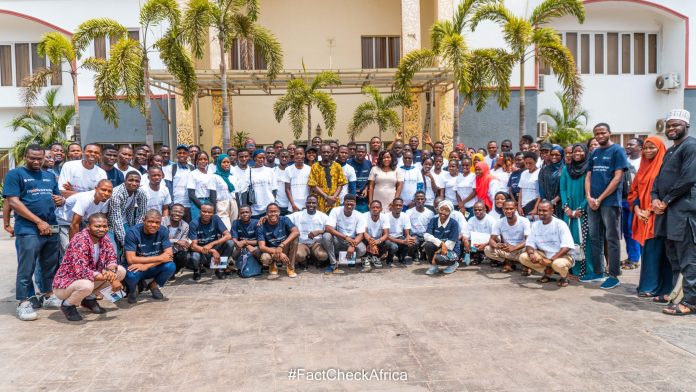By Ismaila Biliaminu Manne
After searching for several opportunities to learn FactChecking, Toheeb Babalola finally found a reason to smile. One could tell from the overwhelming joy reflected on his face as he was shortlisted to attend the Ibadan Fact-checker and Digital Rights Media Workshop. The workshop was organized by FactCheck Africa of Brain Builder Youth Development Initiative, a nonprofit organization, and an independent fact-checking platform. Its focus is to produce fact-check reports on electoral activities, government issues, accountability, climate, and conflicts in Africa.
FactCheck Africa trained over 80 Campus Journalists, Freelance Journalists, and mainstream Journalists in Nigeria on countering fake news and media literacy. The training took place on Friday, February 16th, 2024, at Mahogany Hotel and Suites in Ibadan, Oyo State, Nigeria.
The workshop, which commenced with opening remarks by the Executive Director of the Brain Builder Youth Development Initiative, was facilitated by renowned journalists in the Nigerian media ecosystem. It covered topics such as “Media Ethics and Professional Standards in Journalism,” “Demystifying the Freedom of Information Act,” “Understanding the Basics and Importance of Fact-checking in Journalism,” “Research and FactCheck Africa Research Samples,” “FactCheck Style,” and the launch of a Fact-checking tool called “myAIfactchecker.”

The freelance journalist, Toheeb Babalola, in his mid-20s, now has a reason to smile as he was selected to participate in a fact-checking training after numerous attempts. “After applying to several fact-checking organizations months ago and not being shortlisted, I was surprised to be selected within weeks of applying to FactCheckAfrica,” he shared. “Finally attending my first-ever fact-checking workshop was a fulfilling experience, even though I had prior knowledge of fact-checking but hadn’t attended a physical workshop before,” Mr. Toheeb told this reporter.
He further emphasized that the FactCheck Africa Workshop is a valuable program for addressing malicious statements and visuals in the public domain. “It was an enlightening event for me because it simplifies the work for us journalists. I look forward to attending more fact-checking workshops in the future,” he added.
More Participants Reacts

Fortunately, Toheeb Babalola is not alone; there are over 80 participants in the workshop. Lawal Taiwo Moruf, a student of the University of Ibadan, shared that the workshop is timely due to recent disruptions in the peaceful information ecosystem caused by unverifiable claims, fake reports, and misleading facts, leading to fear and unrest nationwide.
From a session of the workshop, Mr. Taiwo Moruf, who learned the importance of verifying information before disseminating it, developed an interest in holding leaders accountable. He expressed his zeal to request information from public institutions using the Freedom of Information Act (FOI Act).
“The most important aspect of the workshop that stood out for me was the demystification of the FOI Act. The facilitator of the session actually piqued my interest in holding the government and public institutions accountable. Now, I can boldly request any information or clarification from the government and public institutions not only as a journalist but as a citizen of Nigeria.
“Also, I have learned that I should subject every information that comes to me to a thorough verification through the use of Fact-checking tools before I can have a firm belief in it and share it across. Not only that, I have also learned that I could subject any controversial claim to fact-checking in order to debunk or affirm the claim,” Mr. Taiwo Moruf said.
Ugbor Ruth Enang, a freelance volunteer with NGOs on Advocacy matters, expressed her reactions to being selected to participate in the workshop. “I was carefully selected by FactCheck Africa to attend this one-day training on fact-checking. To me, the workshop was an eye-opener on how to combat the raising spread of misinformation that is a major threat to our democracy today,” Miss Ruth said. She further stated that the training has helped her to always fact-check (verify) any information through MyAIfactchecker personal news authentication.
In an interview with another participant, Ghazali Ibrahim, a Campus Journalist and Freelancer, narrated that he has been attending training on fact-checking and media literacy for a quite number of times “but the Ibadan fact-check workshop was different in the sense that the facilitator brought to trained the participants are versatile in the field of fact-checking. They are advocates of anti-fake news campaigns and each of them treats the topics given judiciously.”
“Though I knew how FOI requests work before, but, my knowledge was widened on the act itself during a session with Michael Olatunbosun of Splash FM.
Ghazali expressed that he learned a lot from each session and also contributions from fellow campus journalists made the workshop a memorable one.
Organizers React
In an interview with the Project Manager, Habeeb Adisa, narrated that the training is one of the intensive training the organization aims to do and has held several sensitization programs in different states, “it’s part of the intensive efforts to curb misinformation pollution that we have in Nigeria. We held some sensitization programs at Kwara State, Gombe State, and others, and it’s still going on. We had something like this when we started as FactCheck Election and after the training, we got some participants who returned with us, and some who didn’t return.”
“But this one, we are trying to make it a bigger effort by bringing in people from other states apart from Ibadan to train them on Fact-checking, so that they would be an advocate outside and able to talk about Fact-Checking for people to know about FactCheck. The participants of this training were selected based on the submission they made, and I’m very sure that this would have a big impact on misinformation and fighting against misinformation,” said the project manager.
Also, speaking with one of the organizers of the workshop, Mustapha Lawal, expressed that the primary aim of organizing the workshop is to spread the gospel of Factchecking and select champions of FactCheck in different communities. That, this is just the means to an end, “which meant to train people that would go back to their respective communities within Ibadan and its nearby areas of everywhere they came from and train other people and spread the gospel on the importance of cogent and essential FactCheck is, at this time,” Mr Lawal said.

In a WhatsApp chat with Nurah Jimoh, the executive director of the Brain Builder Youth Development Initiative, she explained that the Ibadan Fact-Checker workshop was initiated in response to the challenges of combating information pollution in the digital landscape. “As a youth-led and youth-focused organization, we targeted mass communication students, campus journalists, freelance journalists, and other young key players in the media space,” she said.
Nurah emphasized the crucial role of fact-checking in credible news reporting and civic duty. “We organized the workshop to equip participants with the skill of fact-checking, aiming for a society where fact always triumphs over fiction,” she added.
Mr. Lawal encouraged participants to apply their newfound knowledge. “I look forward to seeing them become champions of fact-checking initiatives, spreading the gospel of media literacy, and ensuring the proliferation of fact-checking so others can also benefit,” he said.




